For today’s comparison, I’ve chosen two air purifiers that may not be the most attractive but are undoubtedly popular among users.
The Honeywell HPA100 comes from a well-known American brand, fitting within the broad product portfolio of a multinational corporation. On the other hand, the Hathaspace HSP001 is from a relatively young brand, dedicated only to producing air purifiers.
If you’re looking for an air purifier that can cover up to 250 sq. ft. (23 m²) rooms, the Hathaspace HSP001 could be a great option. However, if you need to purify a smaller space, around 155 sq. ft. (14 m²), then the Honeywell HPA100 could be a better fit.
At first glance, both devices feature somewhat outdated designs. While the plastic materials aren’t top-quality, there’s really nothing to complain about. The build quality is just okay for such devices.
I’m sure you have plenty of questions or doubts about these air purifiers—otherwise, you wouldn’t be here, right? In that case, keep reading to find out more about what I’ve prepared for you.
Our Verdict

Frankly, I knew from the beginning that the Hathaspace would have a significant advantage over Honeywell. If nothing else, its higher CADR and advanced features make a noticeable difference.
For these reasons, I picked the Hathaspace HSP001 as the winner of this comparison. It stood out with features such as an air quality sensor, auto mode, quieter operation, multiple stages of filtration, and exceptional performance.
However, if you’re looking for a more affordable option with decent performance, the Honeywell would still fit you well.
If you’re still unsure about which device to choose, feel free to leave a comment below the article or email me directly.
Specs: Hathaspace HSP001 Vs Honeywell HPA100
| Product Image | 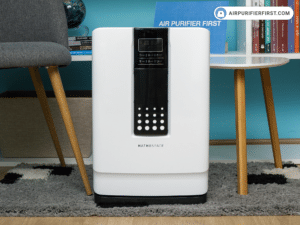 | 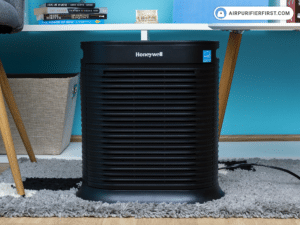 |
| Manufacturer | Hathaspace | Honeywell |
| Model | HSP001 | HPA100 |
| Dimensions (inches / cm) | 13.5 x 7x 19.5 inches (34.2 x 17.8 x 34.8 cm) | 13.94 x 22.6 x 13.54 inches (35.4 x 57.4 x 34.4 cm) |
| Weight (pounds / kg) | 12 lb (5.4 kg) | 8.5 lb |
| Clean Air Delivery Rate (CADR) | 160 CFM (270 m³/h) | 100 CFM (170 m³/h) |
| Coverage (4.8 ACH)
Room Coverage Explanation: ACH is a measurement used in indoor air quality management to indicate how many times the air within a defined space is changed/moved through the filter media.
For more details, visit our ACH calculator tool. | 250 sq. ft. (23 m²) | 155 sq. ft. (14 m²) |
| Performance Ratings Performance Ratings Score Summary: 8.5 - Average Score (67 products) 9.8 - Best Score (2 products) 2.5 - Worst Score (2 products) We use the Temtop LKC-1000S laser particle meter to test the particle removal efficiency of every air purifier. It measures PM2.5 (µg/m3), PM10 (µg/m3), Particles (per/L), and HCHO (mg/m3) in the air, and also calculates the AQI. You can read more about our testing methodology here. | ||
| Filtration Technology | Cold Catalyst Filter, Cellular-Activated Carbon, Antibacterial, True HEPA Filter, and Ionizer | Pre-Filter/Odor Reducing Combo, and True HEPA Filter |
| Filter Replacement Indicator | No | Yes |
| Filter Life | 4-6 months | up to 12 months (True HEPA); about 3 months (Pre-filter/Carbon) |
| Power Consumption
Power Usage Summary: Our extensive testing of 67 air purifiers revealed the following power consumption insights:
Check out our power consumption calculator tool. | 45W | 50W |
| Operating Costs Ratings Operating Costs Ratings Score Summary: 9.1 - Average Score (67 products) 10 - Best Score (2 products) 8 - Worst Score (1 products) We measure the power usage at all speeds using an energy meter, after which we calculate how much it would cost to use the device at a particular fan speed for one month. For reference, we use an energy price of $0.12 per kWh. You can read more about our testing methodology here. | ||
| Number of Fan Speeds | 3 – Speed 1, Speed 2, and Speed 3 | 4 – Low Mode, Medium Mode, High Mode, and Turbo Mode |
| Air Quality Sensor Air Quality Sensor Summary: Out of 67 air purifiers tested, only 31 have the air quality sensor. | Yes | No |
| Air Quality Indicator | Yes | No |
| Auto Mode Auto Mode Summary: Out of 67 air purifiers tested, only 32 have auto mode functionality. | Yes | No |
| Smart App Smart App Summary: Out of 67 air purifiers tested, only 20 have smart app functionality. | No | No |
| Voice Control Voice Control Summary: Out of 67 air purifiers tested, only 20 have voice control functionality. | No | No |
| Other Features | Display LightRemoteTimerIonizer | TimerDimmer |
| Noise Level (low – high) | 41.3 – 49.3 dBA | 48.2 – 58.5 dBA |
| Noise Ratings Noise Ratings Score Summary: 9.3 - Average Score (67 products) 10 - Best Score (1 products) 8.2 - Worst Score (1 products) We use a special noise measurement tool to test the noise level of the air purifier at all speeds. We measured the noise level on the dBA scale. You can read more about our testing methodology here. | ||
| Best Suited For | Living Rooms Bedrooms Dust Quiet Operation | Allergies Small Spaces Portable Use |
| Warranty | 2-5 year | 5-year |
| In-Depth Review | Hathaspace HSP001 | Honeywell HPA100 |
| Price | Check Price on Amazon | Check Price on Amazon |
Performance Test – Comparison
In case you missed it, let me point it out once again: there is a significant difference in room coverage between these two air purifiers. The Hathaspace covers almost twice the area that the Honeywell does.
That said, we performed various tests, and they all confirmed one thing: if you use these air purifiers within the room size recommended by the manufacturer, you’ll be more than satisfied with their performance.
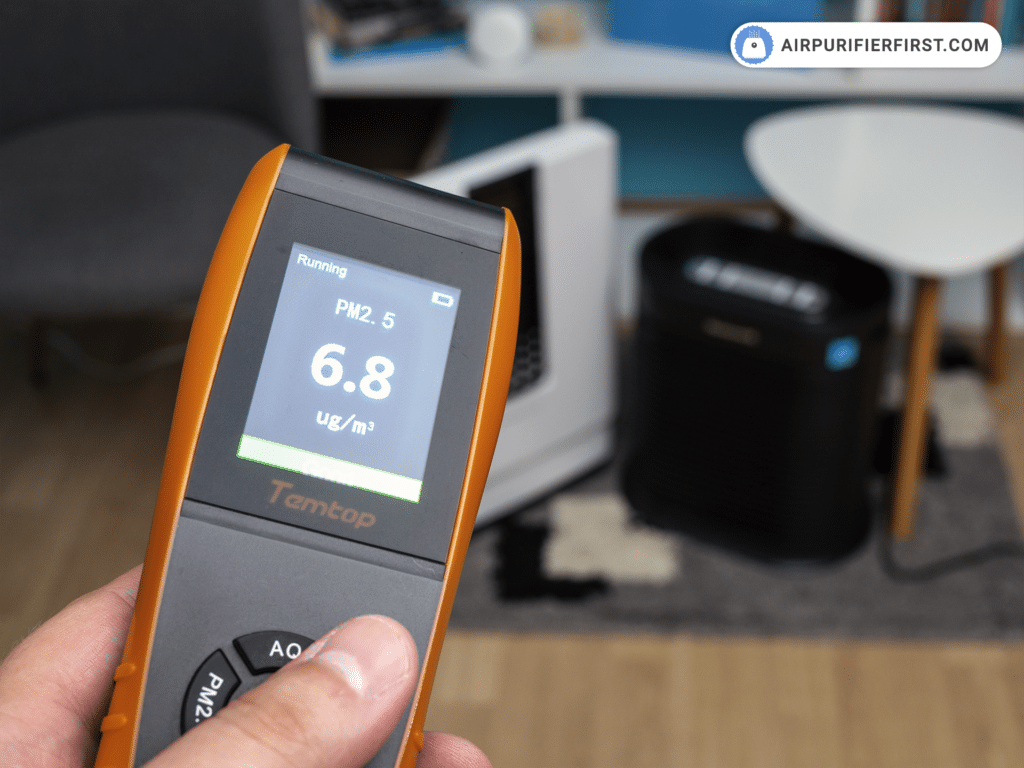
We tested both air purifiers in a 194 sq. ft. (18 m²) room using a Temtop laser particle meter to measure how effectively each device captured airborne particles.
Particle Removal Tests - Comparison
We placed the Hathaspace HSP001 Vs Honeywell HPA100 in two separate tests and measured their performance using the Temtop laser particle meter.
After 60 minutes of running at maximum speed, the Honeywell HPA100 improved air quality by 89%, reducing PM2.5 particulate matter from 94.9 to 11.3 µg/m³.
On the other hand, the Hathaspace HSP001 performed even better, improving air quality by about 94%, reducing PM2.5 from 102.5 to 6.4 µg/m³.
Clearly, the Hathaspace HSP001 outperformed the Honeywell in particle removal tests. I believe this result is due to its higher CADR and additional filtration layers.
Smoke Box Test – Comparison
The smoke test was one of the most interesting parts of this comparison for me. Why? Because I expected the Hathaspace HSP001 to perform much better in this test, but it didn’t.
It’s a larger air purifier with bigger filters, a higher CADR, and more filtration stages. However, the Honeywell HPA100 outperformed it in the smoke test.

The Honeywell removed all the smoke from the test box in just 33 seconds, while the Hathaspace HSP001 took 41 seconds.
What makes this even more fascinating is that the Hathaspace has a much better carbon filter, filled with carbon pellets.
Noise Level Test – Comparison
While the Honeywell HPA100 offers four fan speed levels, the Hathaspace HSP001 has three, plus a sleep mode. However, sleep mode isn’t really a separate fan speed; it simply dims the LED lights and lowers the fan to its lowest speed.

Both air purifiers are relatively quiet at maximum speed, but the Hathaspace is much quieter at its lowest setting. In fact, it’s one of the quietest air purifiers we’ve tested, and I even included it in our buying guide for the best air purifiers for bedrooms.
Noise Levels - Comparison
Comparison of noise levels at all fan speeds between the Hathaspace HSP001 Vs Honeywell HPA100 air purifiers.
At the lowest speed, the Hathaspace HSP001 produces 41.3 dBA, while the Honeywell HPA100 generates 48.2 dBA.
When comparing noise levels at maximum speed, the Hathaspace still comes out on top. It produces 49.3 dBA, while the Honeywell HPA100 reaches 58.5 dBA.
| Fan Speed | Hathaspace HSP001 (dBA) | Honeywell HPA100 (dBA) |
|---|---|---|
| Speed 1 (Low) | 41.3 dBA | 48.2 dBA |
| Speed 2 (Medium) | 43.9 dBA | 50.4 dBA |
| Speed 3 (High) | 49.3 dBA | 54.3 dBA |
| Speed 4 (Turbo) | - | 58.5 dBA |
In this comparison, the Hathaspace HSP001 clearly demonstrated it is much quieter than the Honeywell HPA100.
Operating Costs – Comparison
To begin with, I have to point out that both air purifiers have almost the same wattage. The Honeywell operates with a 50W motor, while the Hathaspace uses a 45W motor.

If you were to run both air purifiers 24 hours a day for a month at maximum speed, your electric bill would increase by approximately $3.05 for the Hathaspace and $2.87 for the Honeywell.
Monthly Power Consumption Cost - Comparison
Comparison of monthly power consumption costs for the Hathaspace HSP001 Vs Honeywell HPA100 air purifiers at all fan speeds.
When it comes to filter costs, don’t be misled by the similar prices for replacement filters. Keep in mind that the Hathaspace requires filter replacement three times a year, compared to just once a year for the Honeywell.
| Fan Speed | Hathaspace HSP001 (W + $/month) | Honeywell HPA100 (W + $/month) |
|---|---|---|
| Standby | 1.4W ($0.12) | 0W ($0) |
| Speed 1 (Low) | 20.3W ($1.78) | 16W ($1.4) |
| Speed 2 (Medium) | 26.5W ($2.32) | 18.1W ($1.59) |
| Speed 3 (High) | 34.8W ($3.05) | 21.3W ($1.87) |
| Speed 4 (Turbo) | - | 32.7W ($2.87) |
This essentially means that, despite similar power consumption, the Honeywell HPA100 is more affordable to maintain annually due to the lower cost of filter replacement.
Features Overview
When it comes to having advanced features, these two air purifiers are pretty much ready to stand up against each other. Although, Hathaspace does have slightly more interesting features to offer, contrary to Honeywell.
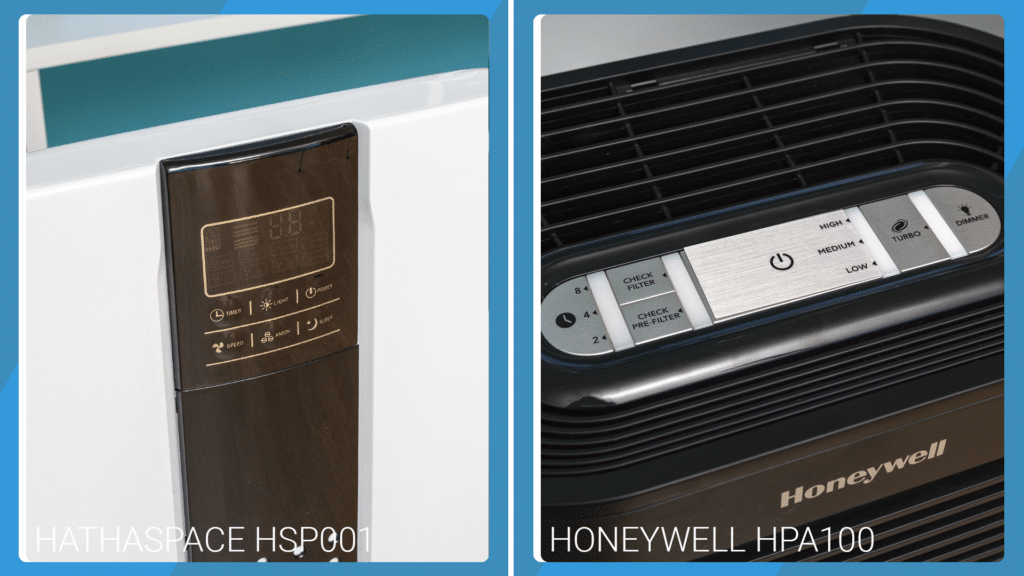
The one thing that caught my attention and came as quite an unpleasant surprise is the missing Filter Reset Indicator, in the Hathaspace air purifier. This means that, no matter how good this device is, you will still need to monitor the filter replacement time. It can be quite tricky to do so, especially if you’re constantly on the go.
On the other side, features like Air Quality Sensor, Auto Mode, and Air Quality Indicator are only present in the Hathaspace HSP001 air purifier.
Air Quality Sensor and Indicator
As I already said, this is one of the features that only Hathaspace HSP001 has. This sensor is used to measure up the level of dust particles in real-time. With the use of an Air Quality Sensor, the total amount of dust particles gets to be shown on the display via Air Quality Indicator. Depending on the pollution level, the Indicator will light up in various colors.
You just got to love air purifiers with this feature because it gives you instant feedback on the air quality and how various allergens or motions affect that quality.
Auto Mode
Another feature that accompanies the Air Quality Sensor is the Auto Mode, and Honeywell HPA100 comes without it. At the same time, Hathaspace HSP001 has these two functions combined in the same mission. That means that, while on Auto Mode, the motor will be switching gears depending on the real-time air quality.

The relevance of this feature lies in the fact that you can leave the appliance running even if you’re not in the room, and you can be assured that the air quality will be under control. The efficiency and reliability are what make the Auto Mode and Smart Sensor a winning combination.
Remote Controller
The Remote Controller feature is only available at Hathaspace HSP001, contrary to its opponent Honeywell HPS100.
Usually, the Remote Controller is a pretty handy feature, no matter the appliance it comes with. But, I do have to point out several flaws in the case of this air purifier. For starters, the plastic quality is pretty low and you can feel it at first touch. Plus, the Controller comes without batteries, which only means another initial item to buy.
Even so, having the Remote Controller is more than a useful option. You get to control all the available options that this air purifier offers, which makes it easier for you to manage the appliance, no matter what distance you’re at.
Timer
The Timer option is available in both air purifiers, and it can be quite a handy feature, or at least if you wish to partially program the appliance, so it fits your needs. Basically, once you set the Timer, the air purifier will run for as long as you set it up, after which it will shut down. You’re available with 2h, 4h, or 8h of Honeywell continuous purifying, whileHathaspace gives you a bit more freedom to set it between 1h and 12h of working.
Filter Reset Indicator
This Indicator is a game-changer in this comparison since Hathaspace HSP001 comes without this option.
On the other hand, the Honeywell HPA100 owns it. Or, shall we say them? Yes, there are two Filter Reset Indicators available in this air purifier. Both of which will let you know, in due time, if and which filter needs to be replaced. There is one Filer Reset Indicator for the True HEPA filter and one for Carbon filters. If you look at the Control Panel, you’ll notice a ‘’Filter Check’’ indicator. That indicator is assigned to a True HEPA filter. Also, you will notice the ‘’Check Pre-Filter’’ indicator, which will notify you once the carbon pre-filter needs replacement.
Sleep Mode
Even though Hathaspace HSP001 has a Sleep Mode option, as opposed to Honeywell HPA100, I wasn’t impressed at all. The reason is that, once the appliance is in Sleep Mode, it only dims the lights, but the fan speed remains on level one.
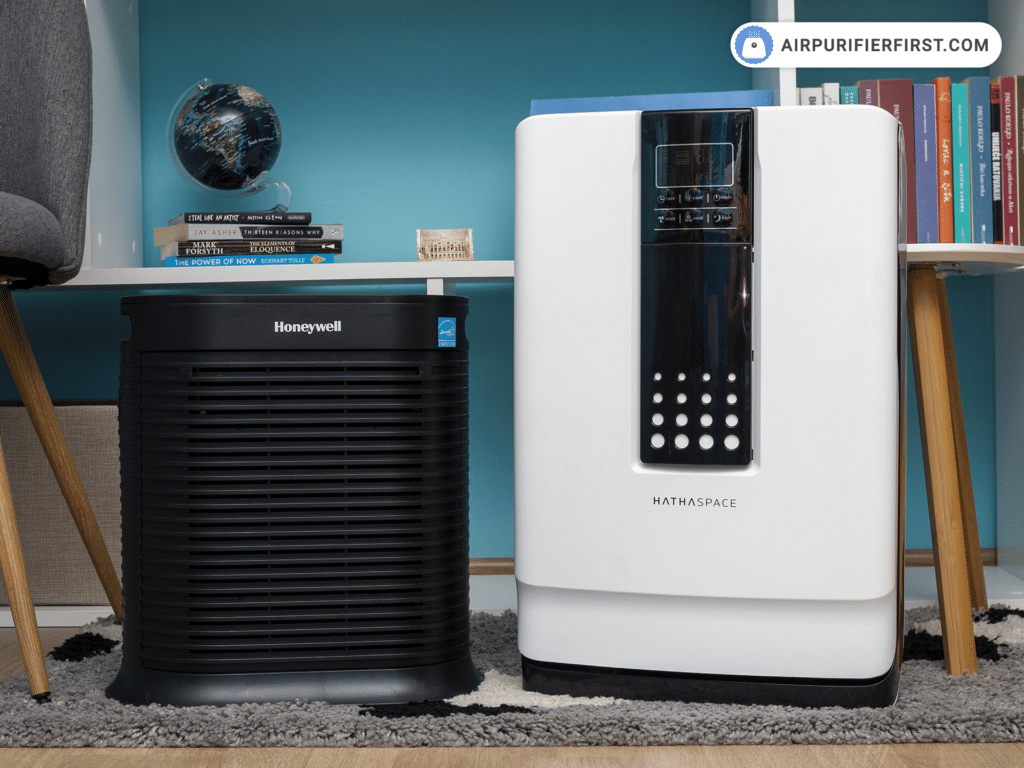
This made me think that the Sleep Mode option is nothing but a farce or some kind of disguise since the air purifier does not have the appropriate speed adjusted to this Mode.
Airflow
With the almost identical, rectangular shape of both air purifiers, it is to be expected that both Hathaspace HSP001 and Honeywell HPA100 will have the same airflow. The air comes in through the frontal openings, after which it gets filtered. Once the filtration is over, the pure air gets released into the room through the upper side of the appliances.
Warranty
Of course, both air purifiers are covered with a warranty, but I have to admit the warranty that Honeywell offers is quite impressive. With Honeywell HPA100, you get a 5-year warranty, with no restrictions or conditions involved. However, I recommend you register on the manufacturer’s website as the owner of this air purifier.
On the other hand, Hathaspace HSP001 offers a bit shorter warranty options, with 2-5 years of available coverage. Initial 2-year coverage comes if you register on the producer’s website straight upon the purchase. But if you subscribe to a filter replacement, also available online, you will get full 5-year warranty coverage.
Filtration Technology
Speaking of the Filtration Technology, the first thing I want to point out is a 2-stage filtration Honeywell HPA100, while Hathaspace HSP001 has 4+1 stages. That is the major difference regarding the filtration process between the two air purifiers.
In the first case, the Honeywell air purifier consists of the Carbon pre-filter, and the True HEPA filter. As always, the Carbon pre-filter comes at first place, protecting the next filter in line from all the greater particles. Next comes the True HEPA filter, which will do a great job in neutralizing the odors, and get the most credit for the amazing performances that this air purifier demonstrates.
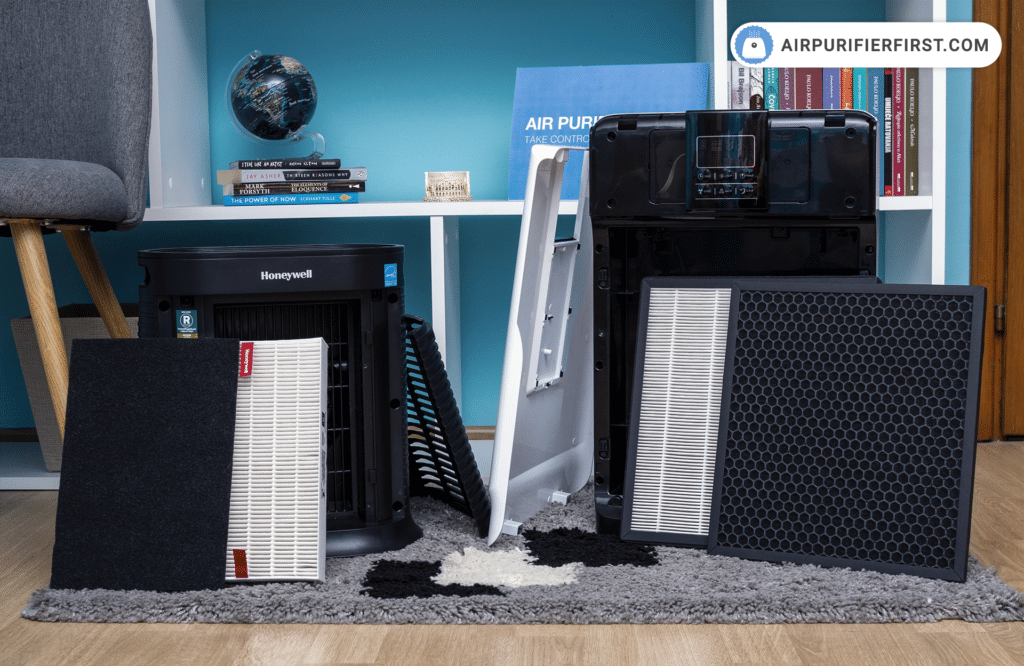
The most confusing part of this comparison turns out to be the Hathaspace filtration process. You would expect the pre-filter to come at first place, instead of the third one, which is the case with this air purifier. Since the pre-filter role is to prevent larger particles from penetrating the other filters, I just can’t seem to understand why it’s been positioned as a third filter in the system.
Now that we’re talking about the hierarchy, let me count down the filters in the Hathaspace HSP001 air purifier, accordingly. In the first place comes the Cold Catalyst Filter, afterward come the Activated Carbon filter and the Antibacterial filter, and later on the True HEPA filter as the fourth in line. The last stage belongs to the Ionizer, which comes as an OFF option by default. Don’t be confused as I was now that I mentioned the Antibacterial filter. It is actually the pre-filter. The most useful information regarding this air purifier would be its CARB certificate, meaning it doesn’t produce illicit ozone amounts.
Another thing that caught me by surprise, only this time in a good way, was that both air purifiers have a True HEPA filter installed. Contrary, I also think that not having a pellet-based carbon filter turned out to be not so great choice for Honeywell HPA100. The reason is it failed in neutralizing the odors and lowering the overall performance of the appliance.
How To Replace Filter On Both These Devices?
You can’t help but notice that Hathaspace has a quite bigger filter than Honeywell. Even so, they don’t last as long as Honeywell filters, and they get pretty dirty in no time while in constant use. While you get to replace Hathaspace filters every 4 to 6 months, Honeywell will demand you to do so only for the carbon filter, while True HEPA filter can last up to a full year.
Another aggravating circumstance is that none of the filters is washable in both air purifiers. This only means you have to pay attention to your air purifier more than you feel the need. I mean, if you want to make it last and serve you well.
Leave a Reply